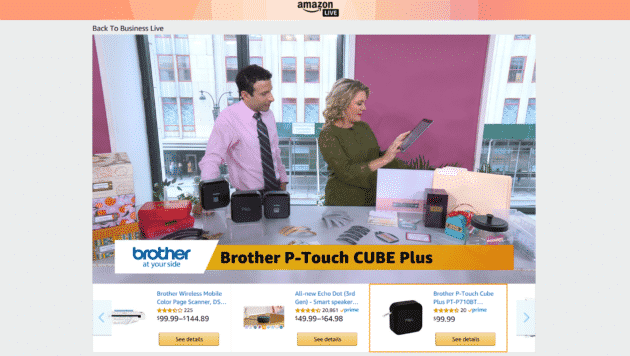What is Amazon Live?
Live streaming is more popular now than ever before, with platforms like Twitch, Facebook Live, and Youtube Live the industry is booming! Of course,...

If, as the old saying goes, it’s lonely at the top, then you’d imagine Amazon to be as isolated as it gets. In fact, the story of Amazon’s success isn’t of a solo trek to the summit; Jeff Bezos and his retail juggernaut have baked partnerships into their winning formula.
That’s unsurprising, perhaps, when you consider that the core of its business is a marketplace – an environment built on collaboration – and Amazon’s partnerships range from those with its smallest sellers to fellow multinational behemoths. Here, we take a look at the mechanics behind some of these partnerships, some modest in size and others vast, but all evidence of Amazon’s relentless pursuit of innovation and new revenue streams.
The most obvious way for brands and retailers to ‘partner’ with Amazon is to sell goods on the company’s online marketplace. Take Chico’s, a women’s clothing chain that, like many others, has partnered with Amazon to release a branded microsite on amazon.com. Losing bricks-and-mortar sales to Amazon, in 2018 Chico’s management opted to collaborate rather than fight with e-commerce giant, and the retailer now sells more than 2,300 different styles on its Amazon store and has seen significant sales growth as a result.
This growth doesn’t come without its threats, however, and chief among them – some would have us believe – is that of Amazon using consumer data from its sellers and partners to rapidly build out its own private-label brands. Apparel is estimated to account for 54% of the total private-label brands. So should partners be worried that they’re making a pact with the devil? Podean’s Global CEO Travis Johnson isn’t so sure, writing in an article for The Drum: “If someone can create similar products with lower quality, no advertising and beat you, then is that their fault…or yours?” As he explains it, a proactive approach to partnership can yield positive results. “Some progressive brands are actually embracing Amazon’s private label approach by engaging with their Launchpad, Grants and Accelerator programs to bolster sales.”
For some, larger brands, the picture is more complex – especially when, as both a retailer and a producer, Amazon acts as a partner and a competitor at the same time. A prime example of this duality is Apple. Apple and Amazon have reached agreements to sell select Apple products on Amazon, despite the fact that the two mega-corporations are in direct competition with one another in several areas. Apple Homepod smart speaker devices, for instance, are not available on Amazon as they are a direct competitor to Amazon’s Echo family. Even, so the fact that a company as dominant as Apple has given in to selling on Amazon speaks volumes: put simply, for all but a few – Nike being a particularly high-profile example – it is now essential for companies of all types to figure out how to fit in with Amazon.
A series of announcements from GAFA (Google, Apple, Facebook, and Amazon) have seen each make ever deeper moves into the financial services market. Among these new ventures are the Apple Card, Facebook Pay, and Google’s collaborations in several finance areas.
Though Amazon has made a number of forays into the financial services world, the 2020 partnership with Goldman Sachs might be one of its most intriguing and disruptive. The investment bank is partnering with Amazon to offer small business loans to many of its US customers, offering lines of credit of up to $1 million to merchants selling on Amazon. Amazon had long been considering the creation of an online marketplace for lending to its merchants, of which Goldman Sachs would have been one of the many lenders, but in the end, Amazon opted to work exclusively with Goldman Sachs in this avenue.
In today’s changing world of retail, many retailers are struggling to keep up with Amazon’s disruption in the market. Countless companies can be seen scrambling to “Amazon-proof” their stores. But Kohl’s has clearly taken a different approach and has joined forces with Amazon in a number of creative ways. In July of 2019, Kohl’s began accepting Amazon returns in all of its stores across the US. Kohl’s has used this partnership with Amazon in an attempt to bring more people to its nearly 1,200 stores countrywide.
“Amazon and Kohl’s have a shared passion in providing outstanding customer service, and this unique partnership combines Kohl’s strong nationwide store footprint and omnichannel capabilities with Amazon’s reach and customer loyalty,” Kohl’s CEO Michelle Gass said in a 2019 press release. “This new service is another example of how Kohl’s is delivering innovation to drive traffic to our stores and bring more relevance to our customers.” So too is it another example of Amazon’s relentless pursuit of customer satisfaction
Healthcare and pharma has been an area of recent focus for Amazon, and its collaboration with JP Morgan and Berkshire Hathaway has led to the creation of joint healthcare venture Haven. Founded to tackle the rising cost of healthcare in the US, Haven is a nonprofit company headed up by surgeon and author Dr. Atul Gawande, who was named CEO by Jeff Bezos, Warren Buffet, and Jamie Dimon.
When asked about the ultimate goal of the company, Gawande stated: “We want to change the way people experience health care so that it is simpler, better, and lower cost. We’ll start small, learn from the experience of patients, and continue to expand to meet their needs as we grow.”
With each passing year, we see more and more companies and organisations join forces with Amazon in a variety of forms. In 2017, Amazon partnered with Sears to sell its own-brand Kenmore appliances. For the last few years, Amazon has worked with the NFL to stream Thursday night games, and the company’s live streaming platform Twitch has partnerships across a number of categories, from live sports – like its tie-in with Spanish soccer giants Real Madrid – to live music, where Beatport was a recent signing. Amazon has even partnered with (sort of) rivals like Microsoft by making its digital assistant, Alexa, available on computers running Windows 10.
For even the largest of brands and companies, it seems, it helps to have friends in high places. And when it comes to Amazon – increasingly the dominant force in US and European retail – they have a friend in the highest place of all.

Live streaming is more popular now than ever before, with platforms like Twitch, Facebook Live, and Youtube Live the industry is booming! Of course,...

Podean’s Amazon Explained Series delivers insights into the drivers of Amazon’s success. Amazon CEO and founder, Jeff Bezos has taken hold of a...

In Jeff Bezos’ letters to shareholders he often mentions how Amazon executives read 6-page memos (called “narratives”) at the start of every meeting.
